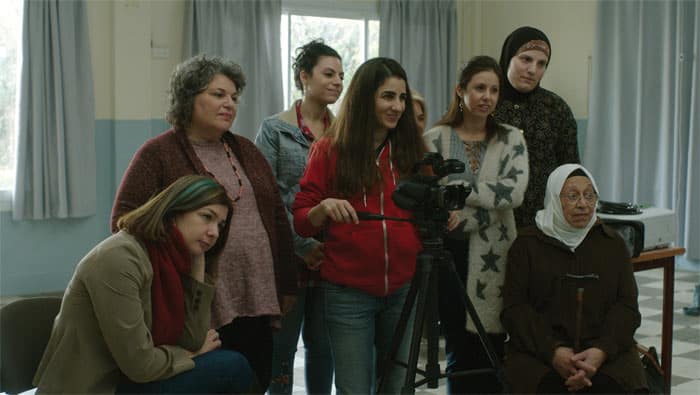 Green Productions
Green Productions Israeli filmmaker Orit Fouks Rotem’s first feature takes on a difficult subject: facilitating peace and empathy among a focus group of four Jewish and four Arab women.
In “Cinema Sabaya,” Dana Ivgy plays Rona, a filmmaker who gathers a group of women and has them record their individual lives at home, then screen their videos for each other.
It’s hard to convey just how mind-opening and hopeful it is to watch a focus group for 94 minutes. But for “Cinema Sabaya,” the simplicity works. While each character is remarkably distinct, they see parts of themselves in each other as they allow strangers to see footage of their private lives.
“The themes that arise from the women’s stories aren’t highly dramatic, in a sense of life and death,” Rotem said. “But they bring up daily dilemmas that preoccupy almost every woman’s mind — financial freedom, motherhood, sexual assault, self-realization and more.”
The conversations between the four Jewish and four Arab women are tense, and the arguments are relevant to the ongoing conflict today. The film dramatizes a very real Israeli government program (sometimes in the form of focus groups) aimed at getting Jews and Arabs to empathize with each other.
Director Rotem’s inspiration for the film came five years ago when her mother was working in Gender Affairs for the Mayor of Hadera, a city near Haifa. Rotem’s mother led a government-sponsored enrichment course that brought Jewish and Arab women together to facilitate empathy. Rotem herself worked with at-risk youth all over Israel. She led the “film your home” exercise while facilitating for these groups in real life.
“The first thing I said in every group that I did, I also told the women [in the film]: ‘this is not a therapy group, I’m not a therapist, and you need to think about what you’re bringing here because the camera has a lot of power. And you’ll touch subjects that are really in your guts, and you have to be careful,’” Rotem said.
At first, “Cinema Sabaya” may seem like a documentary, but it is indeed scripted—although there were times where Rotem encouraged the actresses to improvise.
“I didn’t tell the Arab actresses what to say in some parts. I can’t tell them what to say in the political parts; they improvised it and brought it themselves,” Rotem said.
The word “Sabaya” has multiple meanings in Arabic: a morning light, prisoners of war, and a group of young women — as they say in the film, “just like us.” The characters range in age from 22 to 73.
The first question they are asked is “what are your dreams?” One woman’s dream is to be a grandmother, another dreams of owning a house. And then there’s Souad, an Arab woman in a hijab played by actress Joanna Said, who simply dreams of one day getting her driver’s license. Each of them are issued a video camera and tasked with recording their home life.
“The camera just won’t let you hide, and when your life is seen on a big screen and everybody can see it, it has a power,” Rotem told the Journal.
What ensues is a powerful and immersive journey of discovery. You can feel the tension, you can see the raw emotion on each of the characters’ faces — the tears, the laughs, the jaw-drops and the connections. Rotem only had the actresses do two table reads of the script, as she wanted the characters to discover their counterparts while the camera was rolling.
“I didn’t allow them to be friends and to know details about one another before (the movie was shot), so we didn’t rehearse,” Rotem said. “Some of their dreams were theirs The one who says she wants to be a grandmother, it’s really her dream. I had another dream [written] in my script. I asked them for real what their dream is, and some of them are in the film. Some stories are really theirs in their life as a person. But yeah, I think it’s a special film for the actresses because they really gave a lot of themselves.”
And now, Cinema “Sabya” is Israel’s official entry for Best Foreign Film at the 95th Academy Awards. “Cinema Sabaya” is the 54th Academy Awards submission for Israel. AwardsWatch.com says that Israel’s 10 nominations are the most for any country without a win for Best Foreign Film.
“Cinema Sabaya” has already won five Ophir Awards (Israeli Academy of Film and Television), including Best Picture, Best Director for Rotem, and Best Supporting Actress for Joanna Said. The film also received the Best Picture Award and Audience Award at the Jerusalem International Film Festival.
Without revealing the ending, the film is overall positive and optimistic. And that’s exactly what Rotem hopes audiences will take from watching “Cinema Sabaya.”
“I wish people would come out from this film with feelings that are the opposite of depression — hope,” Rotem said. “I believe there is hope, if we concentrate in what people want on both sides, there is hope. It’s just that we are under these leaders that wants us to fight. So for me it’s a helpful film.”
More information on “Cinema Sabaya” can be found on the film’s website: https://www.cinemasabaya.com/
https://youtu.be/URKn2oAcURE























 More news and opinions than at a Shabbat dinner, right in your inbox.
More news and opinions than at a Shabbat dinner, right in your inbox.